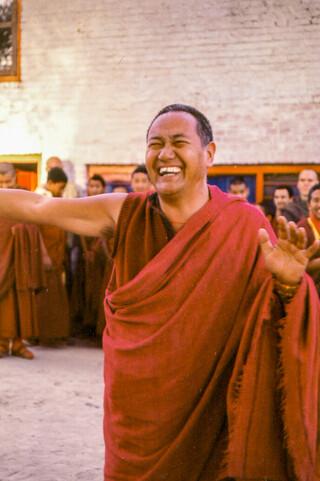I've noticed you offer many books on your website for free. This is so commendable in our capitalist West, to offer the Dharma like this. It truly speaks to your respectability as an organization, and gives great honor to Lama Yeshe’s legacy.
—An Archive supporter
Dear Friends,
As 2022 draws to a close, we thank you so much for your interest in the Lama Yeshe Wisdom Archive and for subscribing to our monthly eletter. Please feel free to share it with others.
We also thank you most sincerely for your support. Without it we would not be able to do what we do. You can see what, with your help, we have accomplished this year in our monthly eletter archive. And there you can see not only what we have accomplished this year but every year over the past nearly twenty!
In this month's issue we have updates on our year-end appeal, new video and podcast teachings by Lama Zopa Rinpoche, and a new Kopan Course posted on our website. You can find an excerpt from this course in our monthly teaching below. Read on and enjoy!
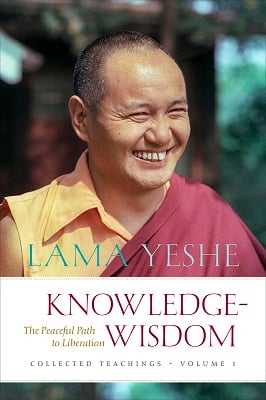 LYWA YEAR-END APPEAL
LYWA YEAR-END APPEAL
As I mentioned, it is your contributions that make this myriad of activities possible. Our target for this year’s year-end appeal is $60,000; so far we have raised about $35,000. If you can, please help us reach our target in order to get 2023 off to an excellent start.
And speaking of excellent starts, our next free book, Lama Yeshe’s Knowledge-Wisdom, is due out in a few short weeks. We will notify you as soon as it’s available, so watch out for that. Making books like this available is what your donations support, so please make your contribution here.
From the Video Archive: How to Practice Compassion for Others
This month from the video archive, Lama Zopa Rinpoche answers a student's question about how to practice compassion for others. Rinpoche also describes how compassion is dependent upon the practice of patience. This interview was held in Taiwan in 1995.
Visit and subscribe to the LYWA YouTube channel to view more videos freely available from our archive. See also the FPMT YouTube channel for many more videos of Lama Zopa Rinpoche’s teachings.
This month on the LYWA Podcast: Everything Depends on Your Mind
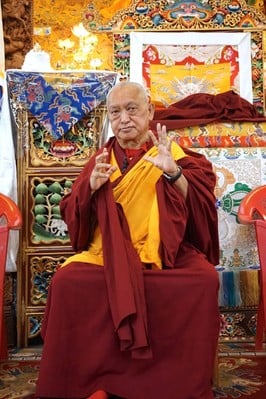 As Buddha said, you are your own enemy or you are your own liberator. You can create a hell realm or you can create enlightenment. Everything depends on what you do with your mind.
As Buddha said, you are your own enemy or you are your own liberator. You can create a hell realm or you can create enlightenment. Everything depends on what you do with your mind.
—Lama Zopa Rinpoche
This month on the LYWA podcast Lama Zopa Rinpoche explains how everything is labeled by the mind as positive or negative and that this wisdom can transform all karmic appearances into happiness. These teachings were given during the 33rd Kopan Course in 2000. You can read along with the full transcript here on our website.
The LYWA podcast contains hundreds of hours of audio, each with links to the accompanying lightly edited transcripts. See the LYWA podcast page to search or browse the entire collection by topic or date, and for easy instructions on how to subscribe.
WHAT'S NEW ON OUR WEBSITE
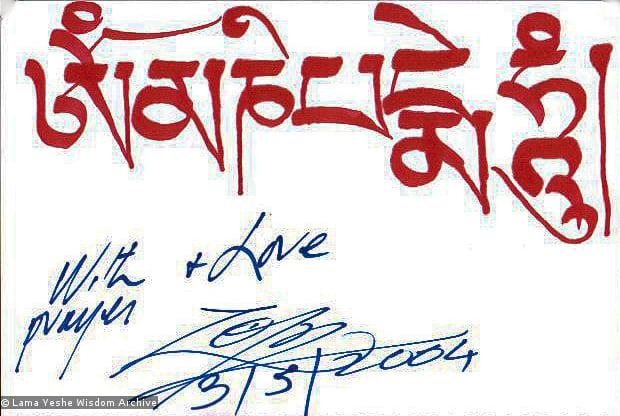 This month we have posted the 31st Kopan Course, lamrim teachings given by Lama Zopa Rinpoche at Kopan Monastery, Nepal, in 1998. Highlights from the course include teachings on protecting the mind, the profound meaning of the Chenrezig mantra, OM MANI PADME HUM, and how this human body is a result of past virtuous karma. You can read these teachings online or download a PDF of the entire course.
This month we have posted the 31st Kopan Course, lamrim teachings given by Lama Zopa Rinpoche at Kopan Monastery, Nepal, in 1998. Highlights from the course include teachings on protecting the mind, the profound meaning of the Chenrezig mantra, OM MANI PADME HUM, and how this human body is a result of past virtuous karma. You can read these teachings online or download a PDF of the entire course.
In our featured teaching below, from this Kopan course, Rinpoche explains that by taking lay vows we avoid harming others and make a practical contribution to world peace.
Every month we share new advices for Lama Zopa Rinpoche’s Online Advice Book, adding more than 100 new entries every year on a variety of topics. There are now more than 2,200 of Rinpoche’s precious advices online.
- Charitable Projects in Ladakh: Rinpoche sent this letter to a person who was helping many others in Ladakh. Rinpoche offered thanks and explained the projects he is supporting in Ladakh.
- Your Faith Will Come Back: Rinpoche advised how to maintain strong faith in Dharma in this letter to a fourteen-year-old student.
- Precious Chenrezig Statue in Garsha: Rinpoche dictated this message for a sign to be placed in front of a self-arising Compassion Buddha statue located in Garsha, Lahaul-Spiti district, India.
- Destroy the Self-Cherishing Thought: This advice on how to transform negative emotions was given to a student who was feeling very unhappy and depressed.
You can always find a list of all the newly posted advices from Lama Zopa Rinpoche on our website.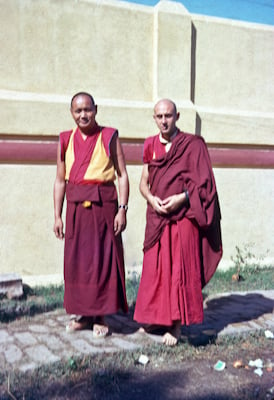
please donate to our year-end appeal!
As ever, thank you for your support and interest. We couldn’t do it without you! So please support our year-end appeal by making a donation today to help us to keep the Dharma flowing freely.
Thank you so much,
Big love,
Nick Ribush
Director
THIS MONTH'S TEACHING: Advantages of Taking Vows
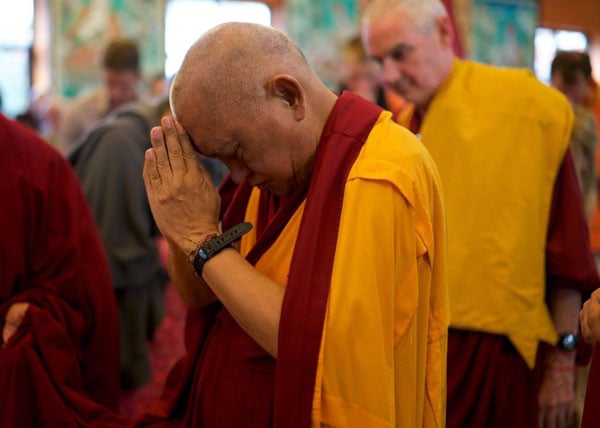 Even living a lay life you can take a number of vows and live in good karma, morality, abstaining from several negative karmas, whichever you can. Even if you can’t take and practice all five lay vows, from those five, take whichever you can. That’s something to do. Every day of this life until you die, that is something to abide in, to live in whatever morality you can. This becomes the most practical thing to do in daily life. It is a very important thing to do in daily life, whether it’s one vow of the lay precepts, or two vows, three vows or five, whatever.
Even living a lay life you can take a number of vows and live in good karma, morality, abstaining from several negative karmas, whichever you can. Even if you can’t take and practice all five lay vows, from those five, take whichever you can. That’s something to do. Every day of this life until you die, that is something to abide in, to live in whatever morality you can. This becomes the most practical thing to do in daily life. It is a very important thing to do in daily life, whether it’s one vow of the lay precepts, or two vows, three vows or five, whatever.
The next thing to understand is this. You can see how essential it is, and you can do this immediately. You don’t have to have some high realizations. By having taken even one vow up to the death, you collect good karma, merit, day and night all the time. Even if you sleep for twelve hours your life is not wasted. You collect good karma continuously, even during sleep. By living in this one vow you are collecting merit all the time. While you are eating, you are collecting merit all the time; while you are walking, you are collecting merit all the time—twenty-four hours a day.
Even if you go into a coma, unable to move the body or communicate, even for years, you are still collecting merit all the time, making your life become meaningful all the time. Like that, you are making preparations for death all the time, creating the cause of happiness of your future lives all the time. It’s the same with liberation and enlightenment, depending on the motivation. Then of course if you take more vows there is no question you create more merit.
The next very important thing to understand is that after the vow is taken, even just one, in everyday life whenever you collect merit by benefiting other sentient beings or by making offerings, circumambulations and prostrations to the Guru, Buddha, Dharma and Sangha, whenever you collect merit in your daily life, the merit is increased so much. Before, when you hadn’t taken any vow, the merit was like a handful of water. But now, after you have taken the vow, the merit that you collect with the sentient beings or with the holy objects is like the ocean, like the Pacific Ocean, the merit increases so much. That makes a big difference to your life, like the earth and the sky, a huge difference. Even by having taken one vow, when you collect merit in your daily life, the merit increases so much.
Another incredible profit in daily life by living in the vows is mentioned in the sutra called Heaps of Jewels. I used to imagine a heap of flowers, but I think that’s mistaken. I think it’s a jewel heap. The sutra is called Heap of Jewels, Piled up Jewels, Heaped Jewels. If all the sentient beings of the desire realm, the form realm and the formless realm were to reincarnate and they all become wheel-turning kings, the most powerful and wealthiest beings in the universe, then each of them make offerings to the Buddha of oceans of butter, Mt. Merus of wax, making light offerings to the Buddha (I think might have mentioned that) for the length of time, eons equaling the number of sand grains of the River Ganga, the river in India. For that length of time, each of them make oceans of butter, Mt. Merus of wax, and light offerings to the Buddha. Now, one person who has taken ordination makes offerings of butter the size of a mustard seed, wax the size of a hair and a tiny light offering to the Buddha. For that person who has taken ordination, their merit is far greater than all those other beings who were born as the most powerful wheel-turning kings in the world and who each make extensive offerings to the Buddha for an incredible length of time. So like this, it makes a huge difference. It makes life most profitable.
So now, those who are taking refuge, I normally emphasize taking the precept to not kill because what taking refuge in the Dharma involves is to not harm others. Therefore, I usually emphasize to take the precept to not kill but if you cannot take this precept, you can take another precept from the five, whichever is easier. For some, to take the precept to not kill is very difficult but maybe to not to tell a lie is easy or to not take alcohol is easy, or to not steal is easy. So for some people it is possible that stopping killing is difficult, but some other precept is easy. If so, you can take that. The main thing is to do less harm, to create less negative karma. That means less suffering for others and less suffering for you and more happiness.
The other thing is that, even if you take one vow, to abstain from one negative karma, whether it is sexual misconduct, whether it is killing, whether it is stealing, whatever it is, even if you take one vow, that means to not harm others. Therefore from now on, whatever number of precepts you’re going to take, that means from today you are not going to harm others. You are not going to give this harm to other sentient beings, by making the vow. That means the human beings, the sentient beings in this world, don’t receive that harm from you, whether it’s killing, whether it’s stealing or whatever it is, the sentient beings in this world don’t receive this harm from you. That means for the sentient beings in this world, there is so much peace and happiness. The numberless sentient beings in this world don’t receive harm but they receive so much peace and happiness from you. The absence of harm is peace that they are receiving. Even just one, abstaining from killing or sexual misconduct or telling lies—whatever it is—numberless sentient beings don’t receive that harm from you from today. That means they receive so much peace and happiness from you.
Therefore, however many precepts you are taking, this is the most practical contribution for world peace. From today, whatever number of precepts you’re taking, this becomes the real practical contribution for world peace, including peace for your family, for your country, for the whole world and for all sentient beings. As you take this vow for the benefit of all sentient beings, all the sentient beings get benefit from you.
Excerpted from Kopan Course No. 31, Lecture 6. Lightly edited by Gordon McDougall.
























